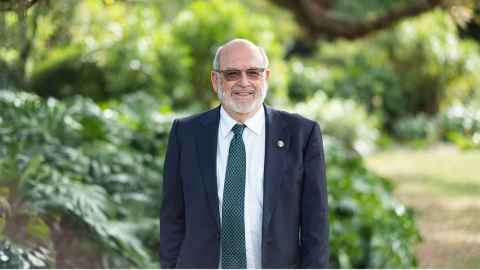Peter Gluckman: 'Solutions require us to transcend partisan politics'
25 June 2020
Opinion: With the world having been enveloped by the Covid-19 pandemic, informed long-term thinking has never been more crucial, writes Sir Peter Gluckman.

While pandemics are inevitable and acute, many other challenges are predictable even if they emerge more slowly.
In the diverse roles I have been privileged to hold, I have seen how a short-term focus for policymaking can interfere with finding solutions to tackle issues with long-term horizons. Societies have difficulty in reaching consensus on complex issues where knowledge, cross-disciplinary expertise and contested values collide. This is demonstrated by the challenge of making progress on sustainability and human-centred development agendas as outlined, for example, in the United Nations Sustainable Development Goals (SDGs).
Even without the added burden of Covid-19, we face an unprecedented time in human history. The negative impact of humans on the planet has become undeniable. Pervasive and disruptive technologies impact on every aspect of the human condition and our institutions; the ways we relate to each other are fundamentally changed by the digital world; demographic change is profound; lifestyles and expectations have changed; mental health issues are rising, especially for young people; and psychological resilience is challenged.
Societies face tough questions. The right solutions require us to transcend partisan politics and the political cycle. We need to find ways to genuinely engage citizens because the current methods of community consultation are not truly representative.
Trust surveys indicate that citizens across the Western world have declining faith in governments to solve their problems. The creation of Koi Tū: The Centre for Informed Futures this year aims to help address some of the tough questions. We are a novel enterprise for a New Zealand university – an independent, apolitical think tank focused on challenges of national and global concern. Academia has a crucial role in this to explore societal and individual resilience in the face of rapid change, developing integrated knowledge for decision making by communities and policymakers in a post-truth world, understanding impacts of rapidly emerging technologies, and identifying the trade-offs embedded within the sustainability agenda.
Trust surveys indicate that citizens across the Western world have declining faith in governments to solve their problems.
We must also face the challenges of the misinformation age. Inconvenient truths are labelled ‘fake news’, and scientifically established facts contested and too often manipulated for purposes that undermine democracy. We have seen how this has impeded actions needed in some countries in dealing with Covid-19.
While much of society’s focus had to be on the acute phase of the pandemic, we are thinking now about the recovery and the longer-term challenges. Will we learn from it, and will it lead to big changes in how we operate? Or will we revert to type and wait for the next crisis?
The pandemic has accelerated our need for deep thinking and conversation on many of the issues and Koi Tū has initiated a wide range of discussion papers on how New Zealand might respond to the reset opportunities created by this global event.
More broadly we are working with UN agencies and academic centres globally on how we might get a better understanding of human-centred development, societal cohesion and resilience. We have co-led an international effort to develop a process and toolkit to assist policymakers in making effective choices to achieve the transformations necessary for faster progress on the Sustainable Development Goals. As you will be aware, the University retained its No 1 ranking in the Times Higher Education University Impact Rankings in April, indicating as an institution we are leading the way.
An important part of the Centre’s activities involves true engagement with civil society, policymakers and the private sector as partners, and to engage the full range of knowledge disciplines. From the outset, beyond our overall goal of battling the misinformation age, we will avoid partisan and short-term issues to focus on longer-term issues that challenge our future.
About the writer: Distinguished Professor Sir Peter Gluckman is director of Koi Tū, Chair of the International Network of Government Science Advice, President-Elect of the International Science Council and former Chief Science Advisor to the Prime Minister. He is also a former director of the Liggins Institute and former Dean of the Faculty of Medical and Health Sciences.
This article first appeared in the Winter 2020 edition of Ingenio magazine.
Email: ingenio@auckland.ac.nz